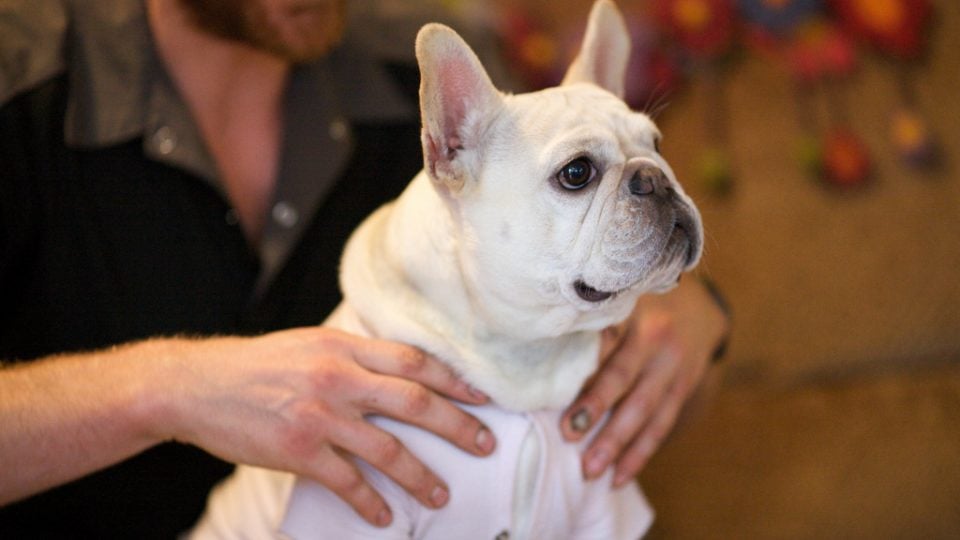“Holistic veterinary care” is one of those buzz phrases that gets tossed around a lot but can be hard to understand. What does it mean to treat your dog holistically?
Holistic care can help your dog by using both conventional medicine to treat injury or disease, and alternative (or complementary) treatments to aid the healing process. For example, if a dog has surgery to remove cancerous tumors, medication is needed to prevent infection and fight the disease, but a holistic treatment like acupuncture or massage may be added to ease pain and encourage healing.
The holistic treatments listed here are some of the most popular alternative therapies used by concerned pet parents. Some of these treatments are more proven than others, and a good vet can determine the best combination of both conventional and alternative treatment for your dog.
As the American Holistic Veterinary Association explains, “holistic thinking is centered on love, empathy, and respect.” The right holistic treatment can improve your dog’s health and happiness, and maybe even extend her life.
Canine Acupuncture
Acupuncture, or the practice of using needles to stimulate pressure points on the body, has been used by humans for thousands of years, and gained popularity in the U.S. in the 1970’s. Acupuncture for dogs took a few years longer to catch on: it was approved as an “alternate therapy” by the American Veterinary Medical Association in 1988 (source).
In ancient Chinese medicine, “needling” along certain points of the body was thought to improve the flow of Chi, or energy, thus promoting better health. For dogs, according to the American Academy of Veterinary Acupuncture, “needling specific points leads to the release of chemicals in the muscles, spinal cord, and brain,” thus stimulating healing.
Although the health benefits are difficult to prove scientifically, there’s plenty of anecdotal evidence to suggest that acupuncture therapy can help relieve dogs of joint and muscle pain, encourage healing after trauma or surgery, and even treat the symptoms of diabetes and cancer.
Acupuncture isn’t cheap; sessions tend to cost around $100, and multiple sessions are needed for best results. But perhaps the best thing about acupuncture is that it has virtually no side effects, and won’t interfere with other treatment or medication.
If you have the budget (and your dog will sit still), it’s a low-risk treatment with potentially huge rewards. Many animal clinics have a licensed acupuncturist on staff, or can readily refer you to a practitioner, so ask your veterinarian if acupuncture is right for your dog.
Hydrotherapy
Hydrotherapy is exactly what it sounds like: physical therapy in water. It’s recommended for dogs who need low-impact exercise, whether they’re recovering from injury or surgery; suffering from joint issues or arthritis; or are simply older or overweight and in need of safe cardiovascular activity.
As demonstrated in the video below, in a typical hydrotherapy session, your dog will be guided into a pool of heated water (the warmer temperature helps soothe muscles and joints) and led through 15-30 minutes of swimming or walking on an underwater treadmill. Depending on your dog’s comfort level and swimming ability, a harness or life jacket may be used to help keep them level and above water.
Hydrotherapy helps build muscle, improve mobility, increase circulation, and decrease stress, and it’s a great workout, to boot. If your dog is suffering from a degenerative condition or could stand to use some weight, ask your veterinarian for a referral to a hydrotherapy pool in your area. You can learn more about the many benefits of hydrotherapy at canine-hydrotherapy.org.
Chinese Herbal Medicine
According to the Chi Institute of Traditional Chinese Veterinary Medicine, Chinese herbal medicine “uses herbal ingredients…in particular combinations or formulas to treat particular disease patterns,” and is best used in conjunction with western veterinary medicine to treat chronic conditions. Proponents of herbal medicine claim it can be used to relieve pain, help improve and restore organ function, and strengthen and support the immune system.
As with acupuncture, the benefits of Chinese herbal treatments for dogs are hard to “prove,” but many people have seen their dogs’ health and happiness improve with the use of herbs.
Some herbs are not safe to use alongside medications such as blood thinners and and diuretics, and as is the case with any ingested medication, Chinese herbal treatments do have potential side effects like vomiting and diarrhea.
Modern practitioners of TCVM note that it is most helpful alongside western veterinary medicine as part of an integrative health plan. See the TCVM website for more info, and ask your vet if Chinese herbal treatments might help your dog.
Magnetic Field Therapy
Magnet therapy is the use of magnetic fields to treat illness or injury, and according to Veterinary Clinics of America, it is “most often used to enhance healing from injuries and wounds” or to treat chronic joint and connective tissue conditions.
The bad news is, magnetic therapy isn’t very popular among medical professionals, and you’d be hard-pressed to find solid evidence substantiating claims that the application of magnets can heal your dog. The good news is, magnetic field therapy is inexpensive, non-invasive, has virtually no side effects, and many dog people swear by its healing power.
You can talk to your vet about the possibility of magnet therapy alongside medical treatment, or find magnet therapy collars online.
Canine Massage
As with human massage, dog massage encourages healing by improving blood flow, stimulating nerves, relaxing muscles, and relieving stress.
While scientific studies of the benefits of canine massage are few, veterinarians concede that there are a couple major benefits: it feels good, and it promotes bonding between dog and person. After all, who doesn’t love a soothing massage from a loved one?
Of course, if you pay someone to massage your dog, it won’t be cheap. Canine massage therapy runs anywhere from $50-$120 per hour, but you can learn many touch therapy techniques yourself, and one benefit of being your dog’s personal masseuse is that it doubles as preventative care.
Regular rubdowns will help you locate new growths or tender spots (note: if you do come across a strange lump or sore spot in the course of a massage, stop immediately and consult your vet. In some cases, the pressure of a massage can make swelling and pain worse).
While massage itself won’t cure your dog’s cancer or heal a broken bone, when used in conjunction with veterinary care, it is a wonderful way to help your dog relax and feel better.
Not all of the above treatments have scientifically proven benefits, but the majority have no dangerous side effects, and they all have fans who say holistic treatments have helped their dogs feel better and live longer. Just be sure to consult a holistic veterinarian who uses alternative treatments consciously alongside Western medicine and can help you determine the best all-around care plan for your best friend. And let your dog be your guide. Sure, she can’t talk to tell you where it hurts or what exactly helps (oh, how much easier life would be if she could), but her mood, energy level, and response to treatment can tell you a lot.
Has holistic treatment helped your dog? Tell us about it in the comments!
The information provided in this article is not a substitute for professional veterinary help.
Top image via flickr/qousqous







